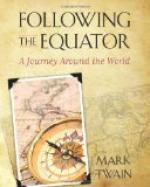There is only one India! It is the only country that has a monopoly of grand and imposing specialties. When another country has a remarkable thing, it cannot have it all to itself—some other country has a duplicate. But India—that is different. Its marvels are its own; the patents cannot be infringed; imitations are not possible. And think of the size of them, the majesty of them, the weird and outlandish character of the most of them!
There is the Plague, the Black Death: India invented it; India is the cradle of that mighty birth.
The Car of Juggernaut was India’s invention.
So was the Suttee; and within the time of men still living eight hundred widows willingly, and, in fact, rejoicingly, burned themselves to death on the bodies of their dead husbands in a single year. Eight hundred would do it this year if the British government would let them.
Famine is India’s specialty. Elsewhere famines are inconsequential incidents—in India they are devastating cataclysms; in one case they annihilate hundreds; in the other, millions.
India had 2,000,000 gods, and worships them all. In religion all other countries are paupers; India is the only millionaire.
With her everything is on a giant scale—even her poverty; no other country can show anything to compare with it. And she has been used to wealth on so vast a scale that she has to shorten to single words the expressions describing great sums. She describes 100,000 with one word —a ‘lahk’; she describes ten millions with one word—a ‘crore’.




